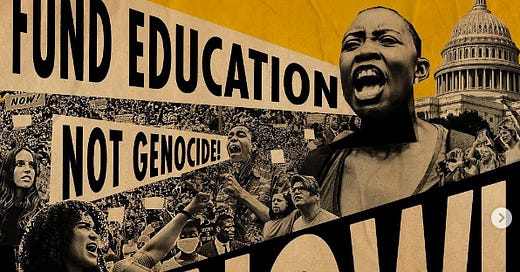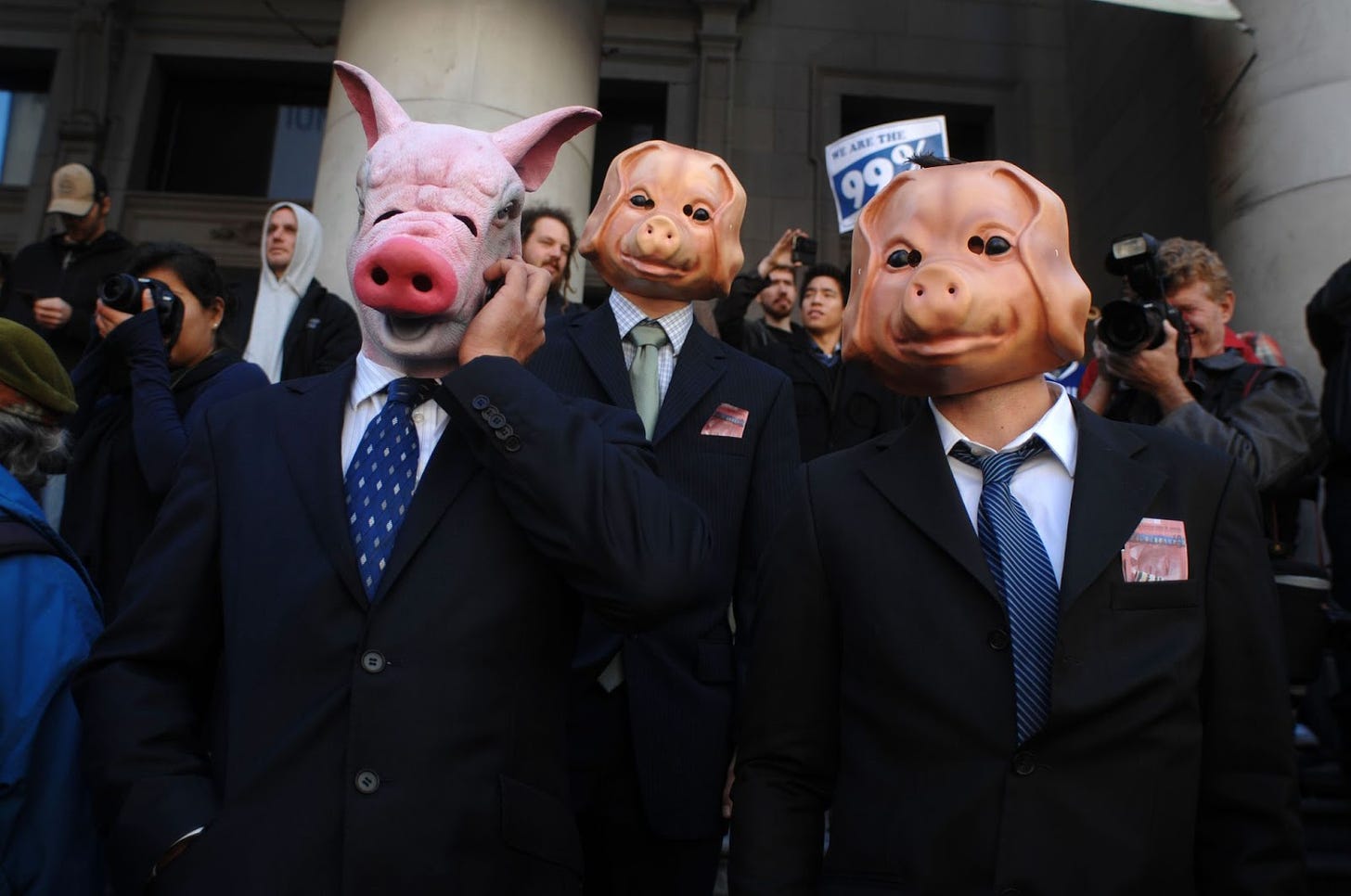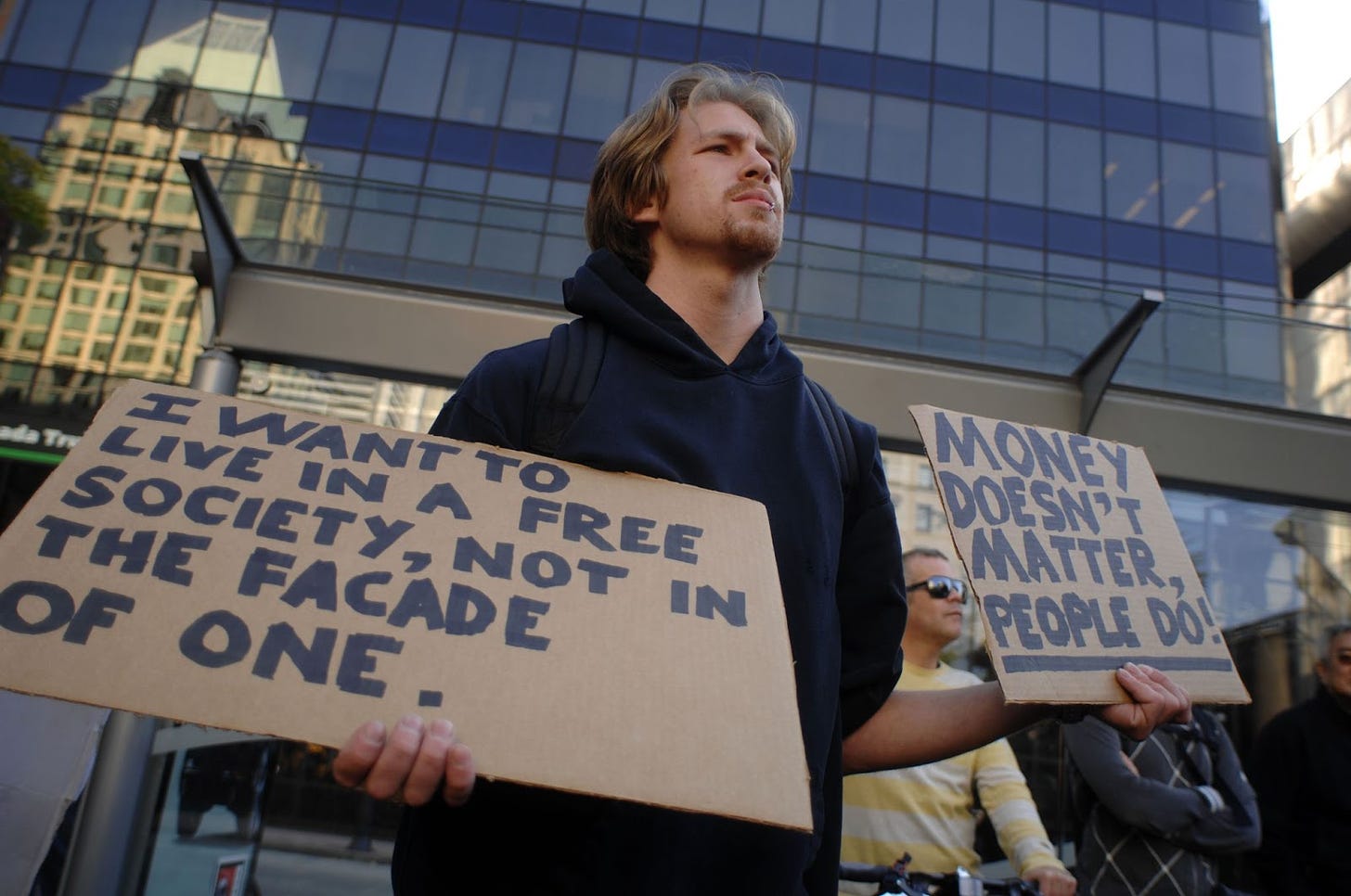Forgive Us Our Debts: How Debt Collective Helps Abolish Financial Servitude
Debt Collective Branched Off From Occupy Wall Street and Unifies Debtors in Mutual Aid for Collective Liberation.
Photo by Debt Collective via Instagram
One of the most enduring legacies of Occupy Wall Street is the Debt Collective, formed in response to the staggering levels of personal debt that plague millions of Americans—especially people of color, women, and students. DC was born out of Occupy’s “Strike Debt” initiative, which emerged as activists recognized that financial institutions wield immense power over people's lives. This power is not just through Wall Street speculation but also through the massive accumulation of personal debt because employers systematically steal wages and price gouges.
What kind of society allows a few to hoard vast resources while those who do the work receive only a fraction of their labor's value? Extracting wealth from communities only serves to deepen inequality. These parasitic systems provide just enough for workers to survive, ensuring they return to work, while the elite live in opulence, indifferent to the struggles of the masses. This system keeps us unable to afford necessities, and their so-called solution is offering access to loans. This mechanism can be more accurately described as modern-day indentured servitude rather than assistance.
Debt as a Tool of Control
Photo by Sergei Bachlakov via Shutterstock
Occupy Wall Street spotlighted how debt functions as a tool of social control, trapping individuals in poverty cycles while the wealthy reap enormous benefits. Our debts are assets to the pigs up top. A capitalist society like ours often encourages people to blame the poor for their struggles, obscuring the role of those who exploit labor and underpay workers. In response, the Debt Collective organized around the idea that debt could be collectively resisted. Their slogan, "You are not a loan," emphasizes the need for solidarity among debtors to challenge the financial system and refuse to pay unfair, exploitative debts.
Today, personal debt continues to ensnare many people. In the 1960s, the U.S. provided essentials like tuition-free public college education, but this began to erode under neoliberal policies. President Lyndon B. Johnson's administration introduced a federally-backed student loan program, marking the beginning of a shift. This coincided with the integration of women and black people into higher education.
Public institutions were gradually defunded, leading to service decline. This decline was then used to justify privatizing essential services—student loans being a prime example. By the time I was born in the 1990s, the student debt crisis was in full swing, with universities and loan providers exploiting guaranteed income by raising tuition and spending irresponsibly.
Despite the rhetoric of liberty, our leaders resist the changes that younger generations demand. Burdening millennials and future generations with debt hampers our ability to drive societal change. While older generations blame millennials for today’s societal ills, they neglect to mention how they drank Reagan’s Kool-Aid and pulled up the economic ladder behind them. The hippie generation, once a symbol of radical change, has largely sold out, holding onto power while accusing us of destroying a society they built. It’s time for them to retire and allow new leadership to emerge.
Mutual Aid through Debt Abolition
Photo by Sergei Bachlakov via Shutterstock
The Debt Collective exemplifies mutual aid by committing to communal resistance against debt rather than leaving individuals to struggle alone. Through organizing "debt strikes" and advocating for debt forgiveness, the group embodies mutual aid principles—standing in solidarity to alleviate the unjust burdens imposed by the financial system. Corporations get more rights than flesh-and-blood people do. Debt Collective has empowered people to see that their struggles are shared and that collective action can challenge powerful institutions.
One of the group's most notable successes came in 2015 with the Corinthian Colleges debt strike. Students scammed by this for-profit institution banded together, refusing to pay their loans. With the Debt Collective's support, they successfully organized and secured $1 billion in loan relief from the Department of Education. This victory demonstrates how mutual aid can spark system-wide change, challenging oppressive structures like the student debt system, not just providing immediate relief.
What we need is mass debt forgiveness. Ironically, many who call the U.S. a Christian nation refuse to practice the biblical concept of Jubilee—debt forgiveness every seven years. While President Biden paid lip service to the idea of student loan forgiveness, we must remember that he played a pivotal role in legislation that prevents student loans from being discharged in bankruptcy. The paltry forgiveness of public servant loans and schools that defrauded students was the expectation anyway.
Meanwhile, billions were forgiven under the Paycheck Protection Program, benefiting large businesses when it was meant to save jobs. Yet, when the idea of relieving student debt arises, it sparks widespread outrage. If we collectively stop paying our student loans, the federal government will be forced to reckon with its commitment to backing these debts. The forgiveness of the PPP loans proves they can discharge debt at any time.
A Future Beyond Debt
Photo by Vitalii Vodolazskyi via Shutterstock
The Debt Collective continues to advocate for full student loan forgiveness, free public college, and the abolition of medical debt. These initiatives are directly tied to Occupy Wall Street’s broader message of challenging economic inequality and promoting systems of mutual care. By organizing debtors into a collective force, the Debt Collective seeks to build a world where education, healthcare, and basic human needs are not contingent on taking on insurmountable debt.
Our work goes beyond immediate debt abolition. We must push for better wages, rebuild a robust social safety net, and develop systems that meet people's needs rather than ensnaring them in debt traps. A just and equitable society uplifts and supports all people. While we may have left behind monarchy and feudalism centuries ago, the financial systems in place today serve a similarly exploitative function. But these structures were created by people—and people can dismantle them. Now is the time!
Beyond Darwinism - Mutual Aid Index
Beyond Survival of the Fittest: Kropotkin's Vision of Mutual Aid
What is the role of solidarity and reciprocity in building equitable and sustainable communities?
Mutual Aid Among Plants and Animals: Cooperating for Survival
Peter Kropotkin Observes How Cooperation Among Species Improves Survival and Shapes Evolution.
Frolics and Barn-Raisings: Mutual Aid Amongst the Amish
Take a Look at the Amish Traditions of Collective Action and Solidarity.
The Arab Spring: Mutual Aid in the Fight for Freedom
See Solidarity in Action with the Collective Struggle for Liberation in the Arab Spring Movements.
The Black Panther Party’s Legacy of Community Empowerment Through Mutual Aid
The BPP protected and served their communities despite rampant racism and being the main targets of the FBI’s Counter-Intelligence Program.
Blessing Boxes: Mutual Aid in Our Communities Today
Find Out How These Simple Free Community Pantries Transform Neighborhoods and Promote Solidarity.
Childcare Collectives: A Modern Expression of Mutual Aid
Childcare Collectives develop when families, friends, and neighbors pool their resources to raise children.
Feeding Hope: The Impact of Community Fridges as Mutual Aid
See How Grassroots Efforts Like Chattanooga’s Hope Community Fridge Transforms Food Access and Fights Food Apartheid.
Grow Food Together: The Impact of Community Gardening as Mutual Aid
Shared Gardens Enhance Food Security, Build Community Bonds, and Promote Well-being Without Personal Expense.
Community Self-Defense: Protecting Ourselves and One Another
Let’s Talk About How Communities Work Together to Protect Themselves From Harm Inflicted by the State and Fascists.
Community Workspaces: Where Coworking Meets Opportunity
Find Out How Shared Community Workspaces Support Creativity and Mutual Empowerment.
Deciding Together: The Consensus Model in Mutual Aid
How Collective Decision-Making Builds Strong and Resilient Movements As Shown by Occupy Wall Street.
Live Together, Thrive Together: Shared Housing as Mutual Aid
Imagine Housing as a Way to Build Community and Share Resources.
Breaking Bread, Building Bonds: What’s Cooking in Community Kitchens?
Learn How These Shared Kitchens Create Lasting Change Through Healthy Meals, Cooking Education, and Mutual Aid.
Migration and Mutual Aid: Navigating a Climate Crisis Together
The USA and Global North Grew Rich Burning Fossil Fuels. Radical Cooperation Can Help Us Adapt to a Changing World.
Forgive Us Our Debts: How Debt Collective Helps Abolish Financial Servitude
Debt Collective Branched Off From Occupy Wall Street and Unifies Debtors in Mutual Aid for Collective Liberation.
Thou Doth Protest? How The Diggers Reclaimed the Commons and Fought Early Capitalism
Learn About the Radical Solidarity and Resistance to the Enclosure of the Common Lands in 17th-Century England.
A World Without Barriers: Consider Accessibility in Mutual Aid
Everyone Becomes Disabled if They Are Lucky. So How Can We Make Our World More Accessible?
Mutual Aid in the Eye of the Storm: Disaster Relief Amid Climate Change
When Disaster Strikes, Mutual Aid Responds: A Blueprint for Resilience Amid More Frequent Catastrophes
Beyond the Ballot Box: Build Dual Power for Real Change
Empower People Through Mutual Aid, Solidarity, and Community Control.
Communities of Care: How Solidarity Transforms Support for Elders and the Differently-Abled
How Can Mutual Aid Principles Change Elderly and Disabled Care From Isolation to Connection?
Growing Resistance: How Food Forests Feed Communities for Free and Defy Capitalism
From Commodities to Commons: The Radical Potential of Agroforestry
Roots of Resilience: Black Mutual Aid Societies in American History
Explore W.E.B. Du Bois’ Work and the Heritage of Solidarity Among Black Folk.
From Despair to Dignity: The Radical Work of Free Clinics
How Mutual Aid and Community Solidarity Transform Access to Healthcare
Feeding Each Other: The Radical Power of Free Grocery Stores
How This Kind of Mutual Aid Transforms Hunger Relief into Community Empowerment
Challenge Capitalism One Free Store at a Time
How Free Stores Empower Communities and Challenge Scarcity
The Past & Future of Self-Governance: How General Assemblies Build Dual Power
Strengthen Communities Through Direct Democracy and Mutual Aid
Let Joy Guide You: The Power of Fun in Change Work
Explore the Role of Laughter, Creativity, and Connection in Community Organizing
Fascism Unmasked: How to Recognize and Resist Modern Authoritarianism
Empower Your Resistance: A Practical Guide to Revolutionary Optimism, Mutual Aid, and Defying Totalitarians
Resist Burnout: Care, Coping, and Wellness in Dark Times
How can we practice self-care to endure the revolutionary marathon and better support one another?
Resistance Anthems: Protest Music for Hard Times
Let’s Unite Our Voices For Justice Through the Power of Music!
Affinity Groups: Decentralized Resistance in an Age of Crises
How Do Small, Autonomous Collectives Build Power and Resistance Against Fascism, Capitalism, and Collapse?
Share a Feast: How Potlucks Build Community and Connection
Let’s Discuss How Sharing Food Nourishes Both Bodies and Bonds Across Generations.
Notes From the Underground: How Forests Teach Mutual Aid
How Do Fungi, Trees, and Other Plants Thrive Through Cooperation and Reciprocity?
Fight Book Bans with Little Free Libraries
How Do Little Free Libraries Turn the Tide Against Book Bans and Censorship?
Read, Rest, Revolt, Repeat: Study Groups as Mutual Aid
How Does Collective Study Build Power, Sharpen Strategy, and Sustain Movements?
Burn After Reading: Comms Discipline for Mutual Aid and Resistance
Think About Encryption, VPNs, Walkie-Talkies, and the Lost Art of Keeping Your Mouth Shut.







